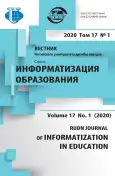Experimental pedagogical activity when teaching computer science to younger students
- Authors: Kornilov V.S.1, Morozova S.V.1
-
Affiliations:
- Moscow City University
- Issue: Vol 17, No 1 (2020)
- Pages: 18-25
- Section: COMPUTER SCIENCE TEACHING
- URL: https://journal-vniispk.ru/2312-8631/article/view/321234
- DOI: https://doi.org/10.22363/2312-8631-2020-17-1-18-25
- ID: 321234
Cite item
Full Text
Abstract
Problem and goal. One of the important components of the educational and methodical work of a teacher who teaches computer science to younger students is the quality control of the acquired system of knowledge of schoolchildren, which involves experimental pedagogical activity. Such experimental pedagogical activities include pedagogical experiments, the results of which are processed and analyzed using mathematical methods. Pedagogical measurements allow to justify the effectiveness of the implemented teaching methodology. Methodology. Pedagogical measurements are carried out in pedagogical research aimed at improving the content, methods, forms and means of teaching computer science to younger students using didactic games. The pedagogical experiment itself includes ascertaining, searching, forming and controlling stages. The analysis of the results of pedagogical measurements aimed at identifying the quality of the obtained knowledge in computer science of younger students can be effectively carried out using mathematical and statistical methods. Results. The conducted pedagogical measurements allow to draw a conclusion about how much younger students have subject knowledge in computer science, which is taught using didactic games; to identify the level of their worldview, logical thinking. Conclusion. Experimental pedagogical activity of the teacher in the process of teaching computer science to younger students allows to identify the effectiveness of such training, the level of subject knowledge of students. Analysis of the results of pedagogical measurements allows, if necessary, to correct the methodology and content of training in computer science.
About the authors
Viktor S. Kornilov
Moscow City University
Author for correspondence.
Email: vs_kornilov@mail.ru
doctor of pedagogical sciences, candidate of physical and mathematical sciences, full professor, deputy head of the department of informatization of education
29 Sheremetyevskaya St, Moscow, 127521, Russian FederationSvetlana V. Morozova
Moscow City University
Email: suhova-svetlanka@mail.ru
post-graduate student of the department of informatization of education
29 Sheremetyevskaya St, Moscow, 127521, Russian FederationReferences
- Batrshina GS. Formirovanie logicheskih umenij u mladshih shkol'nikov na osnove realizacii mezhpredmetnyh svyazej informatiki i matematiki [Formation of logical skills in younger students based on the implementation of intersubject connections of computer science and mathematics] (abstract of the dissertation of the Candidate of Pedagogical Sciences). Moscow; 2014.
- Bizyaeva SA. Igrovye formy interaktivnogo obucheniya kak sredstvo razvitiya poznavatel'nogo interesa studentov [Game forms of interactive learning as a means of developing students' cognitive interest] (abstract of the dissertation of the Candidate of Pedagogical Sciences). Yaroslavl'; 2007.
- Bondarenko AK. Vospitanie detej v igre [Education of children in the game]. Moscow: Prosveshchenie Publ.; 2008.
- Bulgakova NN. Aktivnaya deyatel'nostno-igrovaya uchebno-informacionnaya sreda propedevticheskogo kursa informatiki v nachal'noj shkole [Active activity-game educational and information environment of the propaedeutic course of informatics in primary school] (dissertation of the Candidate of Pedagogical Sciences). Voronezh; 2002.
- Goryachev AV. Metodika obucheniya informatike v nachal'noj shkole, realizuyushchaya ob"ektno-informacionnyj podhod [Method of teaching informatics in primary school, implementing the object-information approach] (dissertation of the Candidate of Pedagogical Sciences). Saint Petersburg; 2004.
- Dergacheva LM. Razvitie poznavatel'noj aktivnosti shkol'nikov na osnove organizacii uchebno-igrovoj deyatel'nosti pri obuchenii informatike [Development of cognitive activity of school children on the basis of organization of educational and game activity when teaching informatics] (dissertation of the Candidate of Pedagogical Sciences). Moscow; 2006.
- Kamalov RR. Komp'yuternye igry kak element shkol'nogo kursa informatiki [Computer games as an element of the school course of informatics]. Informatika i obrazovanie [Informatics and education]. 2004;(5):76–77.
- Kartashova LI, Kornilov VS, Levchenko IV. Primenenie matematicheskih metodov v pedagogicheskih izmereniyah [Application of mathematical methods in pedagogical measurements]: educational and methodological guide. Moscow: MGPU Publ.; 2010.
- Katkova AL. Komp'yuternye igry kak sredstvo stimulirovaniya poznavatel'nogo interesa budushchih uchitelej k prakticheskim zanyatiyam informatikoj [Computer games as a means of stimulating the cognitive interest of future teachers to practice computer science] (dissertation of the Candidate of Pedagogical Sciences). Ekaterenburg; 2007.
- Kornilov VS. Eksperimental'naya proverka effektivnosti obucheniya studentov obratnym zadacham dlya differencial'nyh uravnenij [Experimental verification of the effectiveness of teaching students inverse problems for differential equations]. Vestnik Moskovskogo gorodskogo pedagogicheskogo universiteta. Seriya: Informatika i informatizacija obrazovanija [Bulletin of the Moscow City Pedagogical University. Series: Informatics and Informatization of Education]. 2014;4(30):66–78.
- Kornilov VS, Morozova SV. Metodicheskie podhody k strukturirovaniyu soderzhaniya obucheniya informatike v nachal'noj shkole s ispol'zovaniem didakticheskih igr [Methodological approaches to structuring the content of computer science education in primary schools using didactic games]. Vestnik Moskovskogo gorodskogo pedagogicheskogo universiteta. Seriya: Informatika i informatizacija obrazovanija [Bulletin of the Moscow City Pedagogical University. Series: Informatics and Informatization of Education]. 2019;3(49):24–32.
- Korotkova NA. Sovremennye issledovaniya detskoj igry [Modern research of children's play]. Available from: http://www.voppsy.ru/issues/1985/852/852163.htm (accessed: 20.09.2019).
- Morozova SV. Metodicheskie podhody k obucheniyu informatike s ispol'zovaniem igrovogo metoda [Methodological approaches to teaching computer science using the game method]. Vestnik Moskovskogo gorodskogo pedagogicheskogo universiteta. Seriya: Informatika i informatizacija obrazovanija [Bulletin of the Moscow City Pedagogical University. Series: Informatics and Informatization of Education]. 2017;4(42):100–105.
- Morozova SV. Computer technology in the didactic games in science lessons in junior high. RUDN Journal of Informatization in Education. 2019;16(1):73–80.
- Ryseva TG. Sistema didakticheskih igr kak sredstvo razvitiya poznavatel'noj samostoyatel'nosti shkol'nikov [System of didactic games as a means of developing students' cognitive independence] (dissertation of the Candidate of Pedagogical Sciences. Izhevsk; 2003.
Supplementary files









